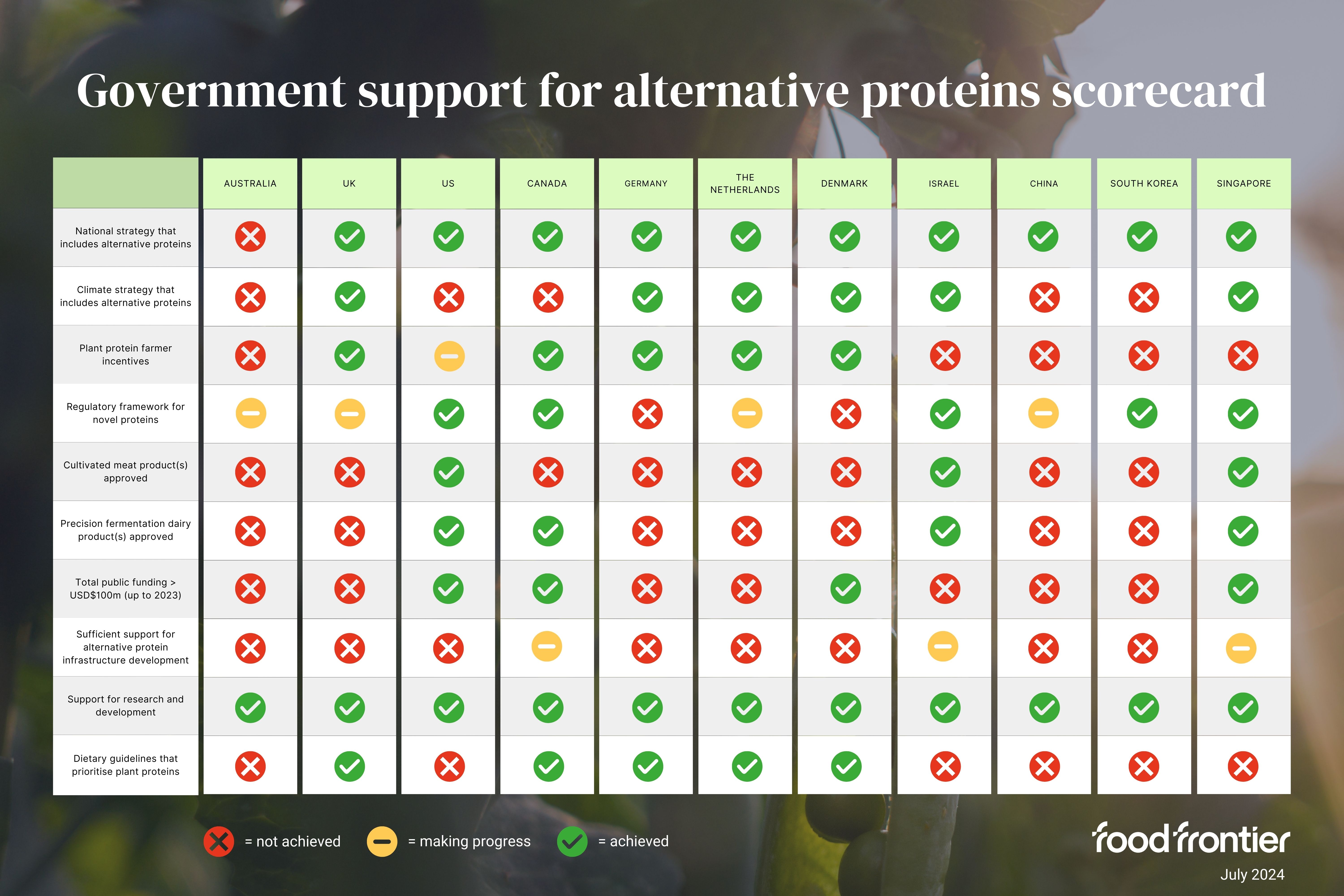5 Mins Read
Singapore, Canada, the US and Israel are the most supportive governments when it comes to alternative protein policies, while Australia ranks bottom on the 10-country list.
Australian think tank Food Frontier has compared the policies of 10 countries to determine which governments have the most progressive stance on alternative proteins.
Singapore – known as a global hotspot for food tech – and Canada top the list, having achieved or made progress on eight of the 10 key policy issues identified in the list (a score of 7.5). They’re followed by the US and Israel, whose score was 6.5.
On the flip side, Australia comes last in Food Frontier’s analysis with a score of just 1.5. China (2.5) and South Korea (3) fare only slightly better, though they have made some recent strides.
“This comparison clearly indicates where Australia is lagging and should serve as a wake-up call to the opportunities available,” said Simon Eassom, CEO of Food Frontier.
“Certain countries have already established themselves as global leaders in the plant-based and cultivated meat industries and capitalising on the benefits of this,” he added. “With the right government support, Australia can thrive in this sector too and cement its own place as a leader in food and agricultural production.”
The countries at the forefront of alternative protein policy

The parameters considered crucial for the industry’s growth include national plans and climate strategies that involve alternative proteins in some form, dietary guidelines that prioritise vegan food, farmer incentives for plant protein, a clear regulatory framework for novel food approvals, and whether any cultivated meat or precision-fermented products have been greenlit.
Additionally, there was a focus on whether these countries had provided more than $100M in total public funding for these proteins (as of 2023), sufficient support for infrastructure development, as well as support for research and development.
The latter was, in fact, the only parameter where all 10 countries were given positive scores. It was also Australia’s only positive score (it was adjudged to be making progress on the regulatory framework). “Australia has recognised good value in investing in R&D, especially when it is going to value-add to existing agricultural industries. This is also the case for Canada,” Eassom told Green Queen. “Other countries recognise R&D as an easy win, and an effective way for government to support value addition.”
Singapore, the US and Israel are the only countries to have approved the sale of cultivated meat, while Canada joins them on the list of nations that have cleared precision-fermented products. Despite its low score, Australia (and New Zealand) could well be the fourth to greenlight cultivated meat, with local startup Vow awaiting confirmation.
“With limited landmass and a high dependency on food imports, Singapore is motivated by food security concerns and has become a global leader in alternative proteins by capitalising on its existing strengths in innovation, technology and R&D,” said Eassom. “Israel is similarly driven by food security and economic growth potential.”
“Canada has a pulse industry comparable to Australia’s and has dedicated significant resources to become a plant protein global leader, recognising the agrifood value-addition opportunities available to them, enabled by significant investment, government-backed innovation, and world-leading crop, process, and product R&D,” he added.
As for the US, its government has “sent strong signals of support” to the sector alongside large investments, “creating a strong ecosystem for innovation and growth”. This includes an executive order to advance the biomanufacturing industry in 2022, which involved a $2B investment to lower food prices, create jobs, strengthen supply chain resilience, improve health outcomes, and reduce emissions.
Why other nations – especially Australia – lag behind

The only countries that aren’t making progress on the regulatory front are Germany and Denmark. That’s because they’re both bound by the EU’s novel foods framework, whose stringency and complicated processes have become a thorny issue for alternative proteins.
It’s the reason why even leading products like the Impossible Burger (which contains a precision-fermented ingredient) haven’t made it to the market yet. “The EU’s regulation covers multiple countries with differing priorities, so reaching alignment is a much larger process that takes a long time,” said Eassom.
As for China and South Korea, he suggested that there has been limited support for alternative proteins so far. “In China, barriers exist due to cultural associations of meat consumption with wealth and health, as well as their emphasis on more traditional plant proteins. However, China did include cultivated meat in the government’s five-year agricultural plan, indicating it is becoming more of a priority,” he said.
“While South Korea has not previously led the charge, government leadership is increasing [on] policy and investment in new technologies like cultivated meat. South Korea has recently provided a regulatory framework for the approval of cultivated meat, with applications expected soon.”
Australia was the only country on the list not to have a national strategy that included alternative proteins. “Australia is yet to fully recognise the economic need and value add of alternative proteins since Australia prioritises the future of our existing agricultural industries,” said Eassom.
“Australia also doesn’t have the same motivations as other countries such as Singapore, since it’s not currently considered food insecure. [State research agency] CSIRO has an alternative protein roadmap, but the government hasn’t announced formal strategies around this.”
Food Frontier recently published a report outlining 10 actions its government can take to advance food systems transformation. “This includes developing and executing a National Food Plan and dedicated strategy to grow domestic food innovation, co-invest with industry in enabling scale-up infrastructure, [and] pursue health strategies that encourage the adoption of plant-centric diets, and more,” explained Eassom.
“We’re seeing positive indications from some state governments and federal ministers, which suggest they are interested in supporting alternative proteins investment and/or R&D. The Climate Change Authority is investigating alternative proteins in its recommendations to government,” he added.
“We have hope that interest and support will increase, but it is taking longer than we had hoped to combat climate change.”



